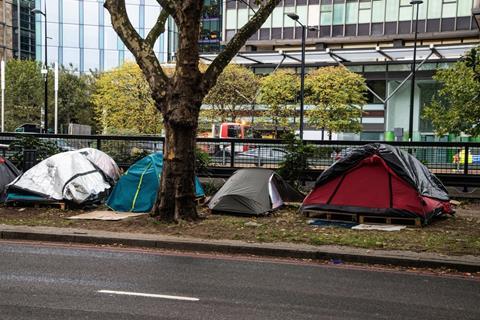Charity chief says decision would have been ‘inconceivable’ for predecessors
Homelessness charity Crisis is set to become a landlord for the first time as it is unable to access social housing reliably to help its users.
In an interview with The Guardian, the charity’s chief executive Matt Downie announced that it was getting ready to launch a fundraising appeal to buy homes of its own for the first time in its 60-year history.

“We will proudly go about acquiring and providing our own homes, mainstream housing, because that’s the answer,” he told the newspaper, while acknowledging that the decision would have been “inconceivable” for his predecessors going back decades.
“People would have expected both councils and housing associations to provide the stock needed for people on low incomes [but] it’s just no longer available,” he said.
“We don’t want to do this, but if nobody else is going to provide housing, we’ll do it ourselves”.
It is not yet clear whether Crisis intends to set up a registered provider to administer theses homes.
Crisis is planning to acquire at least a thousand homes in its first stage and has tenancy support teams in London and Newcastle ready to provide support.
“But the ambition is to move to something even bigger so that we can demonstrate that the solution to homelessness is housing,” said Downie.
The announcement came as Crisis published a study revealing that nearly 300,000 families and individuals across England are now experiencing what it describes as “the worst forms of homelessness”.
This includes rough sleeping, unsuitable temporary accommodation such as nightly-paid B&Bs and hostels, and unconventional places like tents and squats.
Its state of the nation report, which was led by Heriot-Watt University, showed an increase in acute homelessness of 21% since 2022 and a 45% increase since 2012.
The numbers of people having to sleep rough and households having to stay in unsuitable temporary accommodation increased by around 150% each since 2020 levels, with more than 15,000 people sleeping rough last year alone.
Downie said the figures required a “rapid response” from the government.
“We strongly welcomed the UK government’s commitment of £39bn for social and affordable housing. However, with councils across the country being pushed into effective bankruptcy because of the rising bill for temporary accommodation, we need a bold new approach to tackling homelessness,” he said.
“Ministers must deliver on their manifesto pledge to get the country back on track to ending homelessness, including a guarantee that social homes will be delivered as quickly as possible and at scale.”
He said restoring housing benefits to cover the true cost of rents in this month’s Budget could stop thousands from losing their homes.








No comments yet